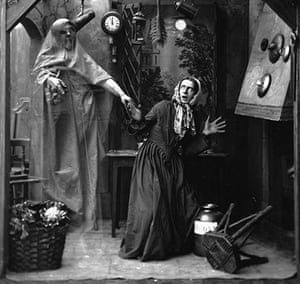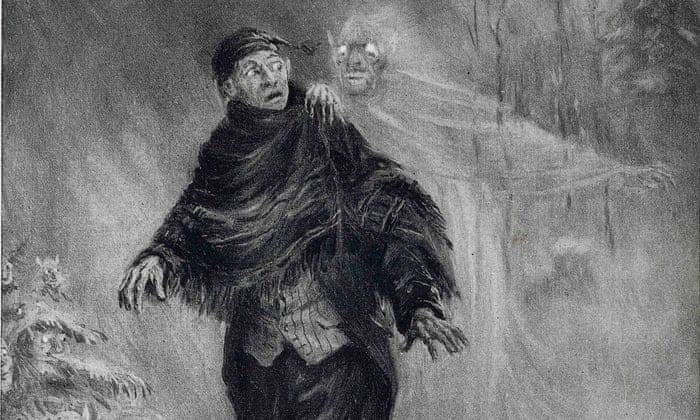From ghoulies and ghosties
And long-leggedy beasties
And things that go bump in the night,
Good Lord, deliver us!
- Traditional Scots prayer
 |
| 1860s : Hulton Archive/Getty Images |
In Victorian England, Christmas Eve (and pretty much the whole Twelve Days of Christmas) was the traditional time to tell ghost stories. People would rake up the fire, sit there with their mulled wine and roasting chestnuts, and scare the bejeezus out of each other. M. R. James, the provost of Kings College, Cambridge, had a tradition of inviting students and friends to his rooms on Christmas Eve where he'd read them a ghost story he'd written. Charles Dickens published ghost stories every year at Christmas in his periodical, All the Year Round, as did other contributors like Wilkie Collins. And, of course, Dickens wrote A Christmas Carol, in which four ghosts are prominent characters (you have to include Jacob Marley!), and the Ghost of Christmas Future was supposed to give you nightmares.
But if you really want nightmares, read Dickens' The Chimes. Toby Veck, a poor ticket-porter, and his daughter, Meg - about to be married to Richard, a young laborer - are confronted by Alderman Wick.
 |
| Alderman Wick and company |
‘You are going to be married, you say,’ pursued the Alderman. ‘Very unbecoming and indelicate in one of your sex! But never mind that. After you are married, you’ll quarrel with your husband and come to be a distressed wife. You may think not; but you will, because I tell you so. Now, I give you fair warning, that I have made up my mind to Put distressed wives Down. So, don’t be brought before me. You’ll have children—boys. Those boys will grow up bad, of course, and run wild in the streets, without shoes and stockings. Mind, my young friend! I’ll convict ’em summarily, every one, for I am determined to Put boys without shoes and stockings, Down. Perhaps your husband will die young (most likely) and leave you with a baby. Then you’ll be turned out of doors, and wander up and down the streets. Now, don’t wander near me, my dear, for I am resolved, to Put all wandering mothers Down. All young mothers, of all sorts and kinds, it’s my determination to Put Down. Don’t think to plead illness as an excuse with me; or babies as an excuse with me; for all sick persons and young children (I hope you know the church-service, but I’m afraid not) I am determined to Put Down. And if you attempt, desperately, and ungratefully, and impiously, and fraudulently attempt, to drown yourself, or hang yourself, I’ll have no pity for you, for I have made up my mind to Put all suicide Down! If there is one thing,’ said the Alderman, with his self-satisfied smile, ‘on which I can be said to have made up my mind more than on another, it is to Put suicide Down. So don’t try it on. That’s the phrase, isn’t it? Ha, ha! now we understand each other.’
 And things only get worse from there. Poor Meg! Poor Toby! And when Toby, looking for solace on a cold New Year's Eve, goes up to the church to hear the bells, and falls to his death, his ghost is shown a future complete with his darling Meg now abandoned, starving, with a newborn, no hope or mercy anywhere on earth, and racing for the river... Let's just say that The Chimes is so bleak that it makes Cormac McCarthy look like a comedian. Yes, Dickens does supply the mandatory happy ending, but until then... it's a treatise on the ultimate result of Victorian economic theory (primarily Utilitarianism and Malthusianism), and a legal system designed to eliminate the poor the hard way. This fun read for the holidays is available for free here: http://www.gutenberg.org/files/653/653-h/653-h.htm
And things only get worse from there. Poor Meg! Poor Toby! And when Toby, looking for solace on a cold New Year's Eve, goes up to the church to hear the bells, and falls to his death, his ghost is shown a future complete with his darling Meg now abandoned, starving, with a newborn, no hope or mercy anywhere on earth, and racing for the river... Let's just say that The Chimes is so bleak that it makes Cormac McCarthy look like a comedian. Yes, Dickens does supply the mandatory happy ending, but until then... it's a treatise on the ultimate result of Victorian economic theory (primarily Utilitarianism and Malthusianism), and a legal system designed to eliminate the poor the hard way. This fun read for the holidays is available for free here: http://www.gutenberg.org/files/653/653-h/653-h.htm |
| FS Coburn. Photograph: British Library/Robana via Getty |
And The Paris Review has a great blog post listing five forgotten Christmas Ghost Stories (check it out here http://www.theparisreview.org/blog/2014/12/19/ghosts-on-the-nog/).
 Why did the Victorians love ghost stories at Christmas? Well, it was dark and cold and beside a good fire was the place to be. The nights are extremely long, and all the old, pre-Christian traditions knew that the veil between here and there was very thin around the winter's solstice. And Christmas Eve - with Christmas Day coming almost immediately - was a time when ghosts could walk the earth and finish their unsettled business, relatively safely (for humans at least).
Why did the Victorians love ghost stories at Christmas? Well, it was dark and cold and beside a good fire was the place to be. The nights are extremely long, and all the old, pre-Christian traditions knew that the veil between here and there was very thin around the winter's solstice. And Christmas Eve - with Christmas Day coming almost immediately - was a time when ghosts could walk the earth and finish their unsettled business, relatively safely (for humans at least).There was also, among the wealthy, the little issue of gas lighting, still in its infancy, which emitted carbon monoxide, which had a tendency to make people see things. And, sticking with the wealthy, let's not forget that, in a Victorian world where almost everyone had servants, and yet those servants were expected to be almost invisible, leading to houses with separate entrances, staircases, even hallways for servants, people would be unexpectedly popping in and out of dark places on a regular basis. Were they always people?
And the poor, huddled around their fire and their candlelight, both sending shadows and ripples of shadows, flickering in the never-ending drafts (there's a reason people - even skinflint Ebenezer - had bedcurtains), squeaky windows, rattling latches, shuddering shutters, and corners dark as the devil's foot...
Besides, people just like to be scared.
Speaking of which (and part of what sparked this blog), I recently read a ghost story by Dylan Thomas called The Followers. I can't find a free e-text, but go check out Dylan Thomas' Complete Short Stories, and enjoy a story that starts out perfectly normal, nothing strange going on, as two young lads try to find something to do on a dull, boring, wet night in a city... I can assure you, it adheres to Mr. James basic rule: 'If I'm not very careful, something of this kind may happen to me!'
But it's still not as scary as "The Monkey's Paw": Keep the lights on.
Happy New Year!
































